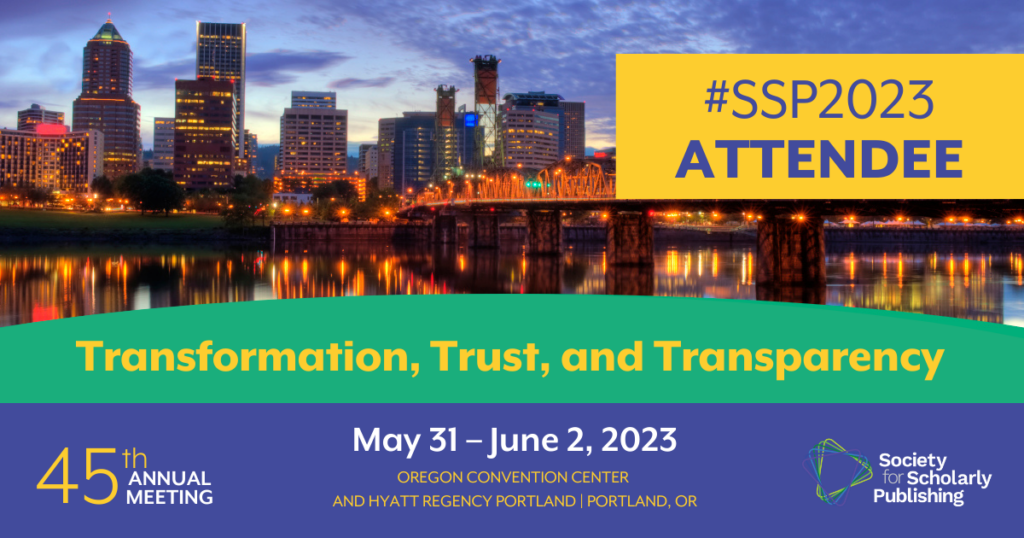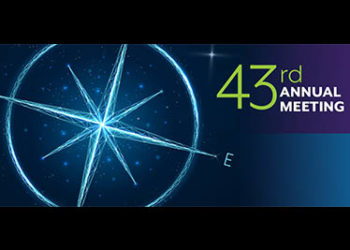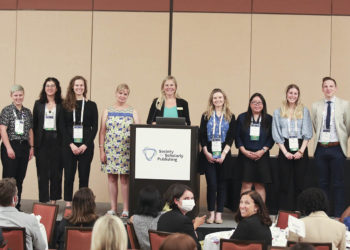The Society for Scholarly Publishing’s 2023 Annual Meeting was held last week, May 31 to June 2, and marked our community’s second post-pandemic in-person gathering. The meeting was held in Portland, Oregon, which provided scenic vistas, hiking trails, and a plethora of great food and breweries. More importantly, it provided people, as there’s no real substitute for meeting with colleagues (and meeting new colleagues) face to face. We asked our Chefs who attended for their thoughts on the meeting.

Alice Meadows
Robert Harington
SSP was especially interesting this year. For me there were several clear themes that came through in what I thought were several days of uniformly excellent presentations. The first theme that wove its way through talks, panels and social conversation was the importance of focusing on research integrity. Discussion of fraud, paper mills, and a pollution of research output was capped off in a fascinating closing plenary debate over whether AI will lead to a doomsday scenario of the disappearance of academic and hence publication trust. Will AI lead to a democratization of knowledge, and a chance for building trust through global equity of wisdom — perhaps a tad optimistic. The second theme for me centered on the importance of accessibility, ensuring that as we innovate we build in access to those with disabilities — at once an inclusiveness and technical discussion. Lastly, I sensed a schism between publishers as we grapple with open access mandates such as the “Nelson Memorandum”. Societies, small publishers, university presses and large corporations are aligned in different ways as Gold APC based publishing runs up against questions of author equity and a rush to publish more. In the background it appears Diamond OA is gaining a foothold, especially outside of North America. And yet the need for sustainable revenues is palpable. Of course, there were supremely silly moments also. Making an appropriate appearance as Dr. Cockroach in Metadata: The Musical, I joined a swarm of insects as we donned antennae and sang cleverly- (and nerdily) written lyrics by the co-organizing team that the original composers would have no doubt squirmed in hearing. These songs and occasional serious presentations, were pounded out on stage to a giggling audience of metadata fans — a true rock opera of silliness, with a dash of Henry Purcell thrown in for good measure.
Lisa Janicke Hinchliffe
As always, the SSP conference was packed full of great content, thought-provoking conversations, and productive networking opportunities. Unsurprisingly perhaps, given the theme of the conference, threats to research integrity was the dominant topic throughout. I was already quite aware of the issues but I came away with a sense that the response being mounted by the industry is underpowered relative to the threats it is facing. And, when I say industry here, I mean the scholarship and research industry writ large, not just publishing. None of the actors — not the publishers but neither the funders, research institutions, or the disciplines themselves — appear to be responding proportionately to the damage that is being done to trust in science and scholarship. The emphasis on catching things before they get formally published in journals, or eventually retracting them afterwards, is so downstream. The perpetrators are still working in labs, getting grants, and — most problematic of all — teaching and mentoring the next generation of scientists and scholars. Who is building the app to deal with all of that? None of this is to say that current efforts are not worthwhile and useful. They are. But, I fear that my take-away from the SSP conference is that they are far from sufficient.
Rick Anderson
Not to brag about my own session, but I was deeply impressed by the rigor, clarity, graciousness, and professionalism brought to the closing plenary (a formal debate on AI and scholarly communication) by debaters Jessica Miles and Tim Vines. I was also impressed by the engagement of our audience, who posed thoughtful and incisive questions and contributed useful comments. In fact, audience engagement was something that really impressed me throughout the conference – some of the best meeting content was contributed in real time by the diverse and insightful session attendees. I’ve never attended a mediocre SSP meeting, but 2023 was among the best in my memory.
David Crotty
For me, the 2023 SSP Annual Meeting was very much in character with the current state of our community — we have clear destinations in mind, but remain unclear on the routes we will use to get there, all while being beset by the unintended consequences spurred by previous poorly-thought-out decisions. I agree with Robert Harington’s observation above about the schisms in our community, but would extend them even further. We had smaller, society, and independent publishers emphasizing the need for development of new business models in order to ensure sustainability and equity, and larger commercial publishers basking in the success of scaled-up, increasingly low-touch/high-volume models that are optimized for current market conditions. Meanwhile a funder expressed disinterest in these seemingly existential questions and technologists (unsurprisingly) suggested technology-based solutions as the cure-all for everything. To me, the meeting reinforced why it’s so important to hold meetings like this and for an organization like the SSP to exist. Everything we do is interconnected, and the solutions we need to produce the future we want can’t come from just one sector of the community. We need to build connections, listen to each other better, and find collaborative actions to take together.
Todd Carpenter — An SSP Theater Review:
Discussion
1 Thought on "Ask The Chefs: 2023 SSP Annual Meeting"
I was interested to see this re Elisabeth Bik (presumably a call from her keynote) for publishers to “please support her request for free access to your journals as a way of showing your support” – was there a shared way to do this to avoid us each contacting her separately? Thanks!



